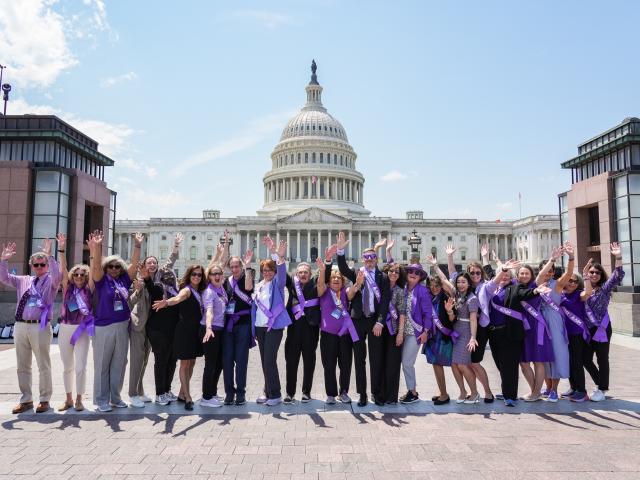BOLD Reauthorization Act, NAPA Reauthorization Act, Alzheimer’s Accountability and Investment Act, and Lifespan Respite Care Reauthorization Act Pass Unanimously
Washington, D.C., March 12, 2024 — Today the House Energy & Commerce Health Subcommittee unanimously passed the bipartisan NAPA Reauthorization Act (H.R. 619 / S. 133), the Alzheimer’s Accountability and Investment Act (H.R. 620 / S. 134), the BOLD Infrastructure for Alzheimer’s Reauthorization Act (H.R. 7218 / S. 3775) and the Lifespan Respite Care Reauthorization Act (H.R. 6160). The Alzheimer’s Association and the Alzheimer’s Impact Movement (AIM) are proud to support these critical bills that will continue making progress in the fight against Alzheimer’s and all other dementia. This action is happening just weeks after Alzheimer’s Association CEO and President Joanne Pike, DrPH, testified before the Subcommittee — a clear signal that there is enormous bipartisan support for these bills.
“These bipartisan pieces of legislation will renew our nation’s commitment to addressing the growing Alzheimer’s and dementia public health challenge and build on the progress made over the last decade,” said Robert Egge, Alzheimer’s Association chief public policy officer and AIM president. “On behalf of those impacted by this devastating disease, thank you to Chairwoman Cathy McMorris Rodgers, Ranking Member Frank Pallone, subcommittee Chairman Brett Guthrie, Ranking Member Anna Eshoo, and all of the lead sponsors and committee members for supporting these critical bills today.”
The BOLD Reauthorization Act would reauthorize the Building Our Largest Dementia (BOLD) Infrastructure for Alzheimer’s Act (P.L.115-406) and empower public health departments to continue improving brain health across the life course and supporting caregivers in their communities.
The original BOLD Act has been essential to creating and growing a public health infrastructure for dementia across the country. Through the law, the Centers for Disease Control and Prevention (CDC) has provided funding to state, local and tribal public health departments to help them implement effective dementia interventions such as reducing risk, increasing early detection and diagnosis, and supporting the needs of caregivers.
“Simply put, more work is needed to support patients and their families combating this vicious disease,” said Chair Brett Guthrie (R-Ky.). “That is why I’m glad we are considering the BOLD [Reauthorization] Act today to accelerate the cutting edge research programs, provide continuous support for our families and caregivers, and advancing resources to help detect and diagnose Alzheimer's disease as quickly as possible. The more we know about the disease, the sooner we'll be able to appropriately treat it, giving patients more precious time with their loved ones.”
“As we all know, Alzheimer's is not a Democrat issue or a Republican issue. It is an issue that affects all Americans,” said Rep. Nanette Barragan (D-Calif.). “[The BOLD Reauthorization Act], which will reauthorize the BOLD Act and empower public health departments to continue to improve brain health and support caregivers in their communities, is something that's going to be super helpful, as somebody who has a mother who has Alzheimer's.”
The NAPA Reauthorization Act would extend the National Alzheimer’s Project Act (NAPA) (P.L. 111-375), a landmark piece of legislation signed into law in 2011. NAPA fundamentally changed the way our nation addresses Alzheimer’s and other dementia and led the way for additional policy victories.
“Alzheimer's is a cruel disease that attacks a person's quality of life. As a pharmacist, I saw firsthand the impact Alzheimer's and other forms of dementia have on patients, families, caregivers and society overall,” said Rep. Buddy Carter (R-Ga.). “While great progress has been made and new therapies are advancing to help patients and caregivers, we cannot let up the fight. In honor of those who have battled and continue to battle this disease, let's continue to work together to raise awareness and pass [the NAPA Reauthorization Act].”
“For me, it's very personal as my mom has been afflicted by this horrific disease,” said Rep. Gus Billirakis (R-Fla.). “We must continue our all-of-government approach in the fight against Alzheimer's.”
The Alzheimer’s Accountability and Investment Act builds on the original Alzheimer’s Accountability Act, which was first enacted in 2014, to ensure Congress continues to hear directly from scientists at the National Institutes of Health (NIH) on what resources are needed to prevent and effectively treat Alzheimer's disease.
With these critical laws set to expire soon, reauthorization is urgently needed. AIM advocates from across the nation have been working to build bipartisan support and remain deeply committed to swiftly passing them into law.
The BOLD Reauthorization Act was introduced by Reps. Brett Guthrie (R-Ky.), Paul Tonko (D-N.Y.), Chris Smith (R-N.J.) and Maxine Waters (D-Calif.) in the House, and Sens. Susan Collins (R-Maine), Catherine Cortez Masto (D-Nev.), Shelley Moore Capito (R-W. Va.) and Tim Kaine (D-Va.) in the Senate.
The NAPA Reauthorization Act was introduced by Reps. Paul Tonko (D-N.Y.), Chris Smith (R-N.J.) and Maxine Waters (D-Calif.) in the House, and Sens. Susan Collins (R-Maine), Mark Warner (D-Va.), Shelly Moore Capito (R-W.Va.), Ed Markey (D-Mass.), Jerry Moran (R-Kan.), Bob Menendez (D-N.J.), Lisa Murkowski (R-Alaska) and Debbie Stabenow (D-Mich.) in the Senate.
The Alzheimer’s Accountability and Investment Act was introduced by Reps. Chris Smith (R-N.J.), Paul Tonko (D-N.Y.) and Maxine Waters (D-Calif.) in the House, and Sens. Susan Collins (R-Maine), Ed Markey (D-Mass.), Shelley Moore Capito (R-W.Va.), Mark Warner (D-Va.), Jerry Moran (R-Kan.), Bob Menendez (D-N.J.), Lisa Murkowski (R-Alaska) and Debbie Stabenow (D-Mich.) in the Senate.
